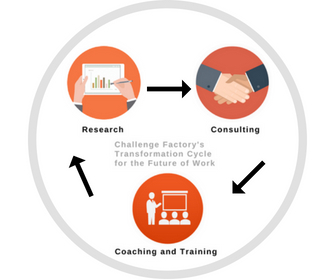By Lisa Taylor
I spend my days working with organizations that are thinking about how the world of work will change between now and 2030. Let’s take two minutes to explore what exactly this entails—and there is an invitation for you at the end of the article.
Some companies approach Challenge Factory because they are worried about aging demographic composition of their workforce and intergenerational tensions as everyone looks to advance in their careers.
Others foresee the impact of new business models and technology and wonder how to shift from the workforce they currently have to the workforce they will need without losing the humanity that is at the core of their culture and values.
New government funding is starting to flow to tackle ambitious issues, such as how to better integrate Veterans into civilian society post-release and how to rethink employment related education and training so that we are fostering the skills that will be needed in a future that is still very much being shaped by technological advancement.
Challenge Factory is part of all these discussions. From the senior executive in the consulting firm who is wondering what’s next for their own career to the largest institutions grappling with challenges that will impact entire generations of workers for decades to come. We are at the table and lending our perspective, methodology, and curriculum, based on our understanding of the five drivers that are shaping the Future of Work.
Many people comment on the breadth of topics and work that Challenge Factory takes on and, while it is true that we are involved in diverse types of discussions and projects, we really tackle one major issue: the Future of Work. Our three business groups tackle this issue with three different lenses, each with their own level of zoom and focus.

It has been a busy spring as we have worked all around the cycle. Here are a few examples of the work that we’ve been doing that has advanced our clients’ ability to shape the future of their workforce and capitalize on the today’s trends. I’ve chosen a few of the assignments we’ve been working on to showcase below to give you a sense of how others are engaging with topics related to the Future of Work.
New insight into longevity and the intergenerational workforce: Lisa has been working with co-author Fern Lebo on a new book that provides unique insight into the roots of today’s workplaces demographic realities with tools for CEOs, CHROs and front-line managers. The Talent Revolution: Longevity and the Future of Work has passed international peer review and will be published in early 2019.
Keynote presentations that challenge outdated thinking: Here are the conferences that we have been part of in the last few weeks. A common “a-ha” moment shared in post-presentation feedback is the realization that we are all actors in how the future will unfold, with responsibilities and abilities to shape what comes next for us, our staff, and our society.
Our summer presentation schedule shifts from large conference venues to smaller leadership retreats within companies. We will be co-creating new strategy with leadership teams from: packaged goods, professional services, financial services, and the public sector.
Respectful workplace training: Before innovation can be fostered within organizations, employees need to feel that their ideas will be heard and respected. In the last month we’ve delivered training to more than 500 employees on how to leverage de-escalation techniques and upshift the culture of each interaction to create a stronger foundation for everyone’s work and career.
Your invitation
The summer is a wonderful time for us to get to know each other better. Let’s pick one topic from this article and set up a time to discuss how it might help be the breakthrough you have been looking for in your own career, your organization, or your entire sector.

